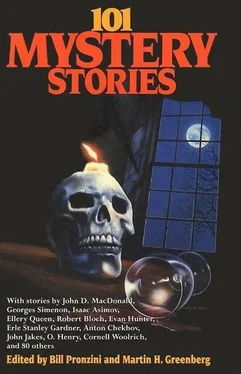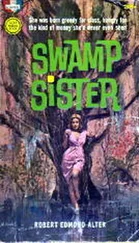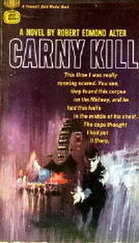Robert Alter - 101 Mystery Stories
Здесь есть возможность читать онлайн «Robert Alter - 101 Mystery Stories» весь текст электронной книги совершенно бесплатно (целиком полную версию без сокращений). В некоторых случаях можно слушать аудио, скачать через торрент в формате fb2 и присутствует краткое содержание. Город: New York, Год выпуска: 1986, ISBN: 1986, Издательство: Avenel Books, Жанр: Детектив, на английском языке. Описание произведения, (предисловие) а так же отзывы посетителей доступны на портале библиотеки ЛибКат.
- Название:101 Mystery Stories
- Автор:
- Издательство:Avenel Books
- Жанр:
- Год:1986
- Город:New York
- ISBN:978-0-517-60361-1
- Рейтинг книги:3 / 5. Голосов: 1
-
Избранное:Добавить в избранное
- Отзывы:
-
Ваша оценка:
- 60
- 1
- 2
- 3
- 4
- 5
101 Mystery Stories: краткое содержание, описание и аннотация
Предлагаем к чтению аннотацию, описание, краткое содержание или предисловие (зависит от того, что написал сам автор книги «101 Mystery Stories»). Если вы не нашли необходимую информацию о книге — напишите в комментариях, мы постараемся отыскать её.
101 Mystery Stories — читать онлайн бесплатно полную книгу (весь текст) целиком
Ниже представлен текст книги, разбитый по страницам. Система сохранения места последней прочитанной страницы, позволяет с удобством читать онлайн бесплатно книгу «101 Mystery Stories», без необходимости каждый раз заново искать на чём Вы остановились. Поставьте закладку, и сможете в любой момент перейти на страницу, на которой закончили чтение.
Интервал:
Закладка:
“Well, Keam was robbed. His wallet’s gone. We called the paper in Tucson to find out what he was doing over here. The city desk man got lathered up and I had to calm him down. But I’m afraid we’ll be knee-deep in newspapermen by this afternoon. Keam was up here investigating a story about land frauds. Digging into the Inca Land Company developments.”
“Ron Owens.”
“Yes.” Pete Kyber made a face to indicate his opinion of Ron Owens — real-estate tycoon, despoiler of the wilderness. I knew Owens, not intimately, and disliked the man as much as Pete did. Usually Owens could be found sporting around in his Lear Jet, flying his pet congressman to Las Vegas, or partying with his Oklahoma oil chums and expatriate Detroit gangster buddies. The “desert estates” he sold were rickety instant-slum dwellings encrusted on drearily bulldozed scrub acres.
Dozens of lawsuits were outstanding against Owens, brought by home buyers who attested that the Inca Land Company had failed to make good on its advertising and had defrauded them in multifarious ways. Naturally Owens had a phalanx of lawyers, some of whom had practiced in Washington and all of whom were adept at delaying cases until hell froze over. Owens was as slippery as a watermelon seed.
Pete Kyber took me back to the interrogation room where Larry Stowe sat picking his fingernails. Pete said, “Larry, you know the prosecutor here, Mike Valdez.”
“Yes, sir.” Larry was still towhead, still vacuous — his mouth hung open most of the time — and, at the moment, uptight.
“Sure we know each other.” I shook hands with Larry. “How are you, son?”
The kid’s handshake was perfunctory, his palm damp; he had trouble meeting my eye. “How’s Mike Junior doing, sir?”
“Fine, just fine. Finishing up at the University this year.”
“That’s, uh, that’s great, sir.”
“Pete, you want to leave us a while?”
“Sure thing.” The Sheriff retreated and shut us in.
I sat down facing the youth across the chrome-and-vinyl table. “Okay, Larry, would you like to go through it with me?”
He was reluctant but I kept at him with gentle persuasion and finally it came out, sheepish: he’d spent the night with a girl at her parents’ ranch a few miles up the highway and that was why he’d been walking back into town so early in the morning. He didn’t want to involve the girl, didn’t want her parents to know he’d spent the night — he admitted with a nervous laugh that he’d left by the bedroom window with his shoes in his hand.
Once we got past that obstacle he told a straightforward story. He’d been walking along the highway shoulder; it wasn’t yet dawn but it was a clear night. Down along Mule Deer Creek he’d walked under the cottonwoods where the big corrugated culvert funneled the creek under the road and he’d heard voices raised in argument. Curious and cautious, Larry made his way past the trees into the brush beside the road. He saw a big car parked in the dust — a Cadillac. Larry didn’t know much but he did know cars and he described that one in fabulous detail, right down to the license number, and I made notes as he talked.
Three men stood out on the slickrock and Larry recognized two of them — cowboys he’d seen around Tooner’s Bar, drinking beer and pawing at the waitresses. The third man was a stranger to Larry; of course that was Philip Keam, the reporter from Tucson.
The cowboys were arguing about what to do with Keam. Larry said, “Bud Baker kept saying they ought to beat the guy up and dump him. The other guy, Sammy Calhoun, he was scared, I guess. He kept grabbing at Bud’s arm and saying they better turn the guy loose or they’d get in trouble with the Sheriff And then I heard Bud say that was what they were getting paid for, to put a good scare into this guy so’s he’d quit nosing around. Then this guy between them, he interrupted the two of them and said, ‘You two have only got two choices. You got to kill me or let me go, because if you start dumping on me I’ll sign a complaint for forcible kidnaping and assault and battery.”
Larry swallowed; I saw sweat on his forehead. “So old Bud Baker just says, real calm-like, he says, ‘All right, if that’s how you want it,’ and I seen him reach down and pick something up and hit this guy over the head with it. He hit him three-four times while he was falling.
“Then Bud and Sammy, they went through the guy’s pockets, and I guess they taken his wallet, and after that they run over to that Cadillac and I watched them drive away. It was starting to get light and this Indian woman come along with some sheep, and I stayed hid-up there in the brush till I seen her run for help, and then I run for home. I figured she’d give the alarm, you know, but then I kept, you know, thinking on it, and finally I come down here to see the Sheriff.”
I obtained warrants on Baker and Calhoun; Peter Kyber’s men went out to arrest them. Pete and I picked at Larry Stowe in several sessions, trying to nail down evidential details; his testimony was direct, his memory clear, and I knew we had a first-class witness in him.
We tried to sweat Baker and Calhoun but they’d been coached. They stood mute, refused to answer any questions without their lawyer, admitting nothing. The lawyer was a skinny fellow from Phoenix who drove up in an air-conditioned Corvette. He wore a sharkskin suit and aviator sunglasses. His name was William Farquhart and he had a white toothy smile — “Just call me Bill” — and I loathed him on sight.
We were obliged by the rules of disclosure to give him the outlines of our case; we had to tell him we had an eyewitness and we had to tell him the substance of the witness’ testimony. Before the trial we would also know we had a positive make on the car driven by the two killers: Ron Owens’ Cadillac.
We forestalled the latter problem by impounding Owen’s car on a bench warrant but this only alerted Owens & Company to their jeopardy and within 24 hours lawyer Farquhart had been reinforced by the importation of three powerhouse lawyers from Tucson and Phoenix.
And later that day Larry Stowe came into my office, scared white. “I got to talk to you. They want me to change my story.”
He’d never seen the two men before. They’d hustled him into the backseat of their car. “It was a two-tone green ’73 Chevy Suburban.” They told him to shut up and just listen.
“This guy says in the first place they’ve got five respectable witnesses to testify Bud and Sammy was over to the Sonoita rodeo grounds that morning, so they couldn’t possibly of been up here bearin’ Keam to death with a rock. Then they told me they got a witness who’ll swear he seen me throw something over the fence behind Tooner’s Bar, and this witness went and picked it up and it turned out to be Keam’s wallet.
“They told me I’d be accused of the murder myself unless I change my testimony and say it was too dark to see the two guys that killed Keam. They say if I don’t identify Bud and Sammy in court they’ll leave me alone.”
“Thanks for coming forward, Larry. You’ve got guts.”
I said to Pete Kyber, “It’s dismally effective. At least we can see the defense tactics now. They intend to make it look as if Larry killed Keam himself — to rob him — and then tried to shift the blame onto the two cowboys.”
“It’s possible that’s what actually happened, Mike.”
“No. I know the kid. Larry’s got a feeble imagination. He could never have dreamed up that story and kept to it so faithfully. He’s not a killer — he never even goes hunting with the other kids — and I don’t believe he’s ever stolen anything in his life.”
“Dumb but honest,” the Sheriff said. “But we’re still in a bind here. If they produce a gang of witnesses to impeach his testimony, we won’t get a conviction. Reasonable doubt.”
Читать дальшеИнтервал:
Закладка:
Похожие книги на «101 Mystery Stories»
Представляем Вашему вниманию похожие книги на «101 Mystery Stories» списком для выбора. Мы отобрали схожую по названию и смыслу литературу в надежде предоставить читателям больше вариантов отыскать новые, интересные, ещё непрочитанные произведения.
Обсуждение, отзывы о книге «101 Mystery Stories» и просто собственные мнения читателей. Оставьте ваши комментарии, напишите, что Вы думаете о произведении, его смысле или главных героях. Укажите что конкретно понравилось, а что нет, и почему Вы так считаете.












